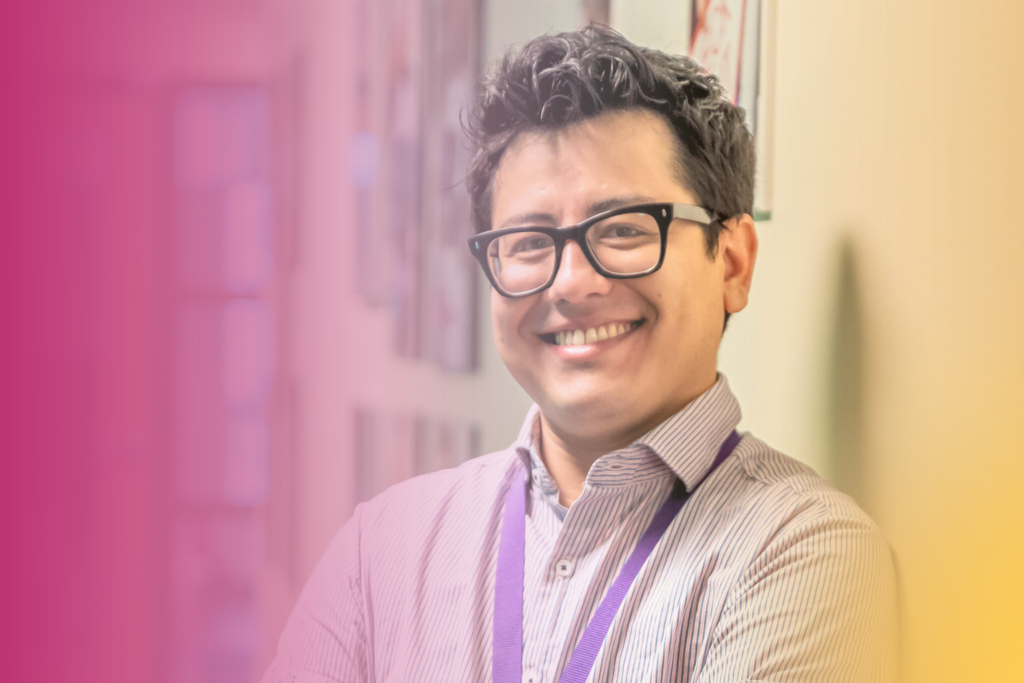Rainbow Health Ontario’s training sessions for service providers are at the heart of RHO’s work. Many clinicians rely on these on-demand and scheduled courses to fill in gaps of knowledge on 2SLGBTQ health care, as well as build the confidence necessary to enacting meaningful change in their practices.
Our instructors play a pivotal role in ensuring learners make the most out of these trainings. In his role of Training & Education Specialist, Juan works with experts and community members to develop and deliver trainings to healthcare and social service providers with the goal of increasing their cultural and clinical competencies in working with 2SLGBTQ people. They also provide consultation for clinics, community health centres, and others organizations who are working to remove systemic barriers to care and improve health equity for 2LSBGTQ people all across the province.
Juan shares his highlights of working in 2SLGBTQ health education, as well as what went into the development of two of RHO’s newest courses: Fondements 2SLGBTQ—a French adaption of our flagship course 2SLGBTQ Foundations—and 2SLGBTQ Emotional and Mental Health.

Why was it important for RHO to adapt Foundations for French learners?
There are at least 25,000 2SLGBTQ Francophone Ontarians, according to estimates drawing from provincial statistics of Francophones and 2SLGBTQ Ontarians. This is a large number of people who not only face systemic barriers to culturally safe and inclusive care on the basis of their gender and sexuality, but also struggle to find this care offered in their native French language. Similarly, Francophone service providers struggle greatly to find 2SLGBTQ resources and education to better care for this underserved population.
In order to bridge this gap, we knew it would be incredibly important to offer our flagship course in French for Francophone service providers. Right now and for a limited time, Rainbow Health Ontario has made Fondements 2SLGBTQ free for all learners.
What considerations went into the course development of 2SLGBTQ Emotional and Mental Health?
Beyond including the most recent research on mental health outcomes for 2SLGBTQ populations and making sure we discussed pertinent issues like conversion therapy, we wanted to centre a trauma-informed and intersectional lens while taking a strength-based approach. A certain quote from the book Caring for LGBTQ2S People: A Clinical Guide Second Edition, comes to mind to illustrate our focus: “You will recognize here principles of good therapy that you will know from your experience with other clients, because working with LGBT2SQ clients has much in common with the encounter any therapist has with any client. But the special context and specific lived experience of LGBT2SQ people will often bring a particular focus or emphasis to the way we use these familiar techniques.”
What do you find most rewarding about providing online educational opportunities?
The ability to reach providers whom we would not otherwise be able to reach, either because of geographical restrictions or because of time restrictions. Virtual education has opened so many doors and opportunities and made professional development much more accessible to more providers. I get to connect with folks from Thunder Bay to Peterborough—all in the same virtual classroom! Having practitioners from different sides of the province in the same room allows for a certain cross-pollination that was not possible pre-virtual learning. At the end of the day, this all means that even in the most rural places in northern Ontario for example, 2SLGBTQ will finally have access to affirming and safe healthcare and social services. And as a trans person myself, the life-saving impact and importance of wide-uptake of this work is never lost on me. I am so grateful to every provider that takes our trainings.
How have learners used the knowledge and skills gained from your courses in their workplaces?
We have folks in leadership positions apply their learnings in a systems-wide way, such as by developing anti-discrimination policies to create safer spaces, and reviewing their intake forms and EMR systems to be more accurate and inclusive. Other practitioners often cite the skills and knowledge as informing stronger therapeutic bond their clients, contributing to a stronger sense of critical thinking when it comes to gender, sex, and sexuality, and overall feeling more confident about working with diverse populations. It is really amazing to see learners take what they have learned in our courses and apply them immediately to their healthcare and social service settings in various ways.
Anything else you’d like RHO News readers to know?
With the current social climate and rising incidents of hate towards our communities, 2SLGBTQ people need us now more than ever. We need champions of 2SLGBTQ health equity in every corner of the province to help remove barriers to care, improve health outcomes, and support the most vulnerable.
Regardless of where your organization is at in your path to inclusivity, we are here to support you in your goals to better serve the 2SLGBTQ community! Please do not hesitate to reach out to us at training@rainbowhealthontario.ca
